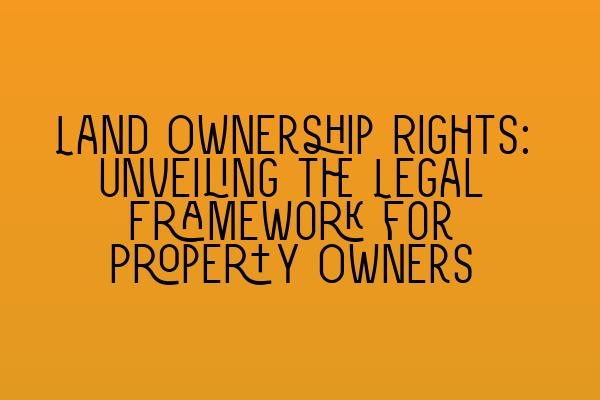\
Land Ownership Rights: Unveiling the Legal Framework for Property Owners
Welcome to the SQE Property Law & Land Law blog! In today’s post, we will delve into the intricate world of land ownership rights and explore the legal framework that governs property ownership. Whether you are a property owner, a prospective buyer, or simply interested in understanding the laws surrounding land ownership, this post is for you.
Understanding Land Ownership Rights
Land ownership rights refer to the legal rights and responsibilities one has over a specific piece of land. These rights include the right to use, enjoy, and dispose of the land. However, it’s important to note that land ownership rights are not absolute, but rather subject to various legal considerations and restrictions.
One significant aspect of land ownership rights is the concept of property boundaries. Establishing and maintaining clear and accurate boundaries is essential to avoid any disputes with neighboring landowners. Boundary disputes can be complex and time-consuming, which is why seeking professional legal advice is crucial.
When it comes to land ownership, it’s also essential to understand the various legal interests that can exist in a property. These interests range from freehold ownership, where the owner has absolute title to the land, to leasehold ownership, where the owner has a temporary right to occupy the land for a specified period. Other interests include easements, covenants, and rights of way, which can significantly impact how a property is used and enjoyed.
The Legal Framework for Property Owners
The legal framework for land ownership rights in the UK is governed by a combination of legislation and case law. The most critical piece of legislation is the Law of Property Act 1925, which sets out the legal principles relating to land ownership. This Act codifies many of the common law principles established by the courts over the years.
Additionally, other legislation, such as the Land Registration Act 2002, regulates the registration of land and the creation of legal interests. The Land Registration Act aims to provide clarity and certainty regarding land ownership by requiring all land to be registered and maintained by the Land Registry.
Understanding the legal framework is crucial for property owners, as it determines their rights and obligations. It provides a guide for resolving disputes, entering into contracts, and ensuring compliance with the law. Consulting with a property law solicitor is essential to navigate through the complexities of the legal framework and protect your land ownership rights.
Protecting Your Land Ownership Rights
As a property owner, it is essential to take proactive steps to protect your land ownership rights. One such step is to ensure that all legal documents relating to your property, such as deeds, leases, and contracts, are accurately drafted and properly executed. These documents form the foundation of your legal rights and responsibilities, and any errors or omissions can have significant consequences.
Another crucial aspect of protecting land ownership rights is understanding and complying with planning regulations and environmental laws. Development on your land may be subject to various restrictions, including zoning regulations, building permits, and environmental impact assessments. Failing to comply with these regulations can result in legal consequences and potential challenges to your land ownership.
To further safeguard your land ownership rights, it is advisable to engage the services of a property law solicitor. A solicitor experienced in property law can guide you through the legal process, identify potential risks, and provide expert advice tailored to your specific situation.
Conclusion
In conclusion, understanding the legal framework for land ownership rights is essential for property owners. By grasping the concepts of land boundaries, legal interests, and the governing legislation, property owners can navigate the complexities of property ownership and protect their rights effectively.
If you are interested in further enhancing your legal knowledge, we invite you to check out our related articles:
- Interactive SQE Mock Tests for Contract Law: Test Your Knowledge
- Join Our SQE Contract Law Webinars: Expert Insights and Guidance
- Contract Law Reforms: An Analysis of Recent Changes
- Parties in a Contract: Rights and Responsibilities
- The Importance of Ethics in Contract Law: A Comprehensive Guide
For more information on land ownership rights or to seek professional legal advice, please do not hesitate to contact SQE Property Law & Land Law. Our team of experienced solicitors is ready to assist you in all aspects of property law.
